#aelia caligula
Explore tagged Tumblr posts
Text
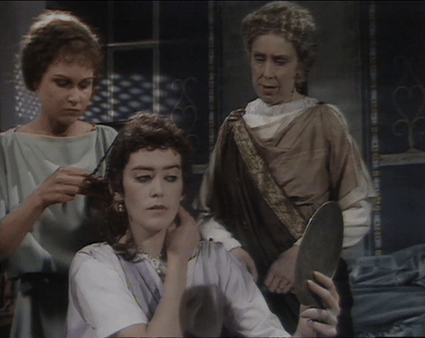
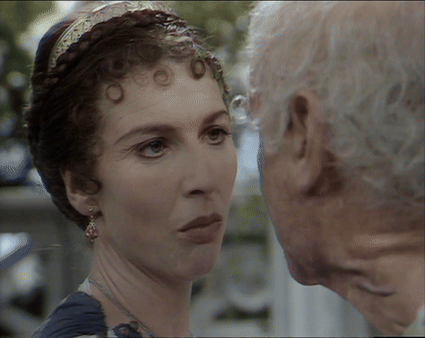
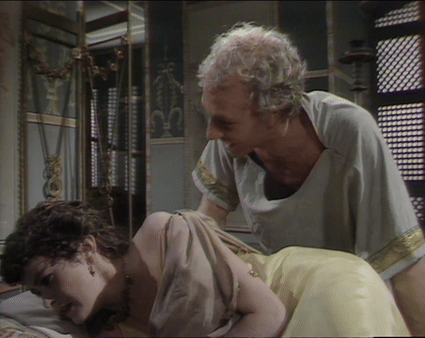


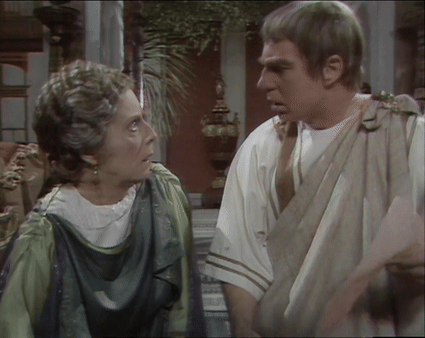




I, Claudius Episode 8 Reign of Terror
I shall make you my successor, Gaius Caligula! I've decided. You shall stay here with me. Rome deserves you. I will nurse you like a viper in her bosom.
#i claudius#bbc i claudius#claudius#emperor claudius#derek jacobi#antonia minor#margaret tyzack#tiberius#geroge baker#caligula#john hurt#livilla#aelia paetina#agrippina the elder#sejanus#patrick stewart with hair#ancient rome#perioddramaedit#so so many great scenes in this episode#i think this might be actually the best episode of the show#i really struggled to just choose just 10 gifs#the caligula claudius meeting#i love both interactions between claudius and aetia#the way she and antonia take his hands and he is like wtf#its probably the most affection claudius has ever got from his mother#and it's accidental because she is catfighting with someone else#meetings of three emperors on capri!#i don't like sejanus but the way he smiles when he realises he was played#antonia sitting in front of Livilla's door will never stop being iconic#missing: it's got elephants in it!
46 notes
·
View notes
Text
Claudius: The fool of the dynasty.
Claudius was born in Lugdunum, Gaul on August 1, 10 BC. On his mother's side, he was the grandson of the legendary Mark Antony and great-nephew of emperor Augustus. His father was the son of the Empress Livia and brother of emperor Tiberius.
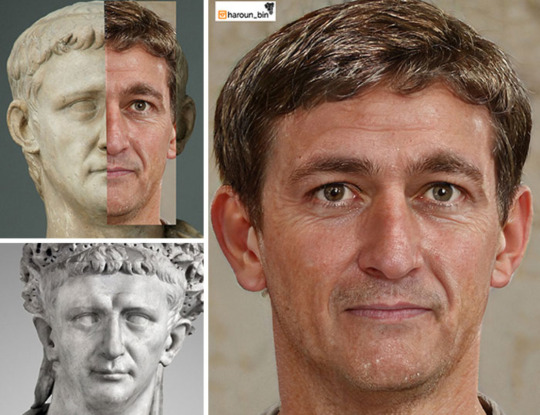
According to historical sources: His sister, Livilla, after hearing an Augur say that her younger brother would be emperor, exclaimed: "May the gods save Rome from such misfortune." His grandmother, Livia, avoided talking to him because "when he was a child, the empress felt uncomfortable seeing and hearing him." During his childhood, the family avoided taking him to public events so as not to be seen. All this drama just because Claudius was lame, stuttered and had a tic.
During the reigns of Augustus and Tiberius, that is, for almost his entire life, he was prohibited from holding public office because of his "defects." From a very young age it was determined that he could never be heir to the throne. This was determined by his family but not by his destiny.
Two wives

Year 9 AD: Empress Livia persuaded a close friend and wife of a senator to marry her daughter Plautia Urgulanilla to 18-year-old Claudius.
They had a son, Claudius Drusus, who died at 14 years old when he threw a piece of pear into the air to catch it in his mouth and the piece got stuck in his throat. Years before the son's death Claudius divorced when his brother-in-law, brother of Plautia, murdered her wife by throwing her out of a window.
Year 28: The prefect of the Praetorian Guard, Sejanus, was plotting to seize the throne. In his eagerness to join the imperial family, he had managed to persuade Claudius to marry his sister Aelia Paetina. In 29 they had a daughter, Antonia. In 31 Sejanus's conspiracies and murders were discovered; the Emperor Tiberius sentenced him to death. Claudius divorced Aelia but never abandoned his daughter Antonia.
Year 37: Interestingly his nephew "the mad emperor Caligula" was the first of the family to see that nothing prevents Claudius from holding an important position. Claudius at age of 46 was appointed consul. Months later, on the same year, his mother Antonia the Younger passed away.
Third wife

In the year 38, Claudius married a young woman member of the dynasty. On her mother's side, Messalina was the granddaughter of Antonia the Elder, Claudius' aunt, and on her father's side, the granddaughter of Claudia Marcella Minor, one of the daughters that Augustus' sister Octavia (Claudius' grandmother) had from her first marriage.
It should be noted that the story of Messalina as a nymphomaniac and promiscuous lady was a creation of Agrippina the Younger, written after Messalina's death. The hatred between the two women was legendary. Historical sources point to a lover of Messalina in the last months before her death, and that relationship was more an attempt by Messalina to secure her power and especially the future of her son than a matter of love or passion.
The less thought day
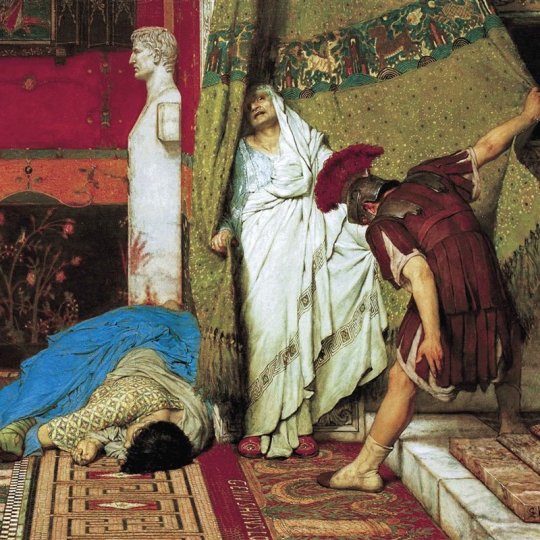
On January 24, 41, the emperor was assassinated by the Praetorian Guard in collusion with several senators. Minutes later, the emperor's wife and daughter were also murdered.
And what no one would have thought possible happened: At the age of 50 Claudius became Caesar. The fourth emperor of Rome.
According to the historians Flavius Josephus and Cassius Dion, Claudius, terrified, thinking that the senators' plan was to exterminate all the members of the imperial family to restore the republic, hid behind a curtain. A Praetorian soldier found him and immediately proclaimed him emperor because he was the only male in the dynasty who could rule, the other remaining member being his 3-year-old grandnephew Lucio Domitius, whom 9 years later Claudio himself would give the famous name Nero.
Upon ascending to the throne, he deified his grandmother, Empress Livia. Also named his deceased mother Augusta and designated her birth date- January 31- as a feast day in Rome.
Claudius the Conquer

Claudius surprised Rome by proving to be not only an intelligent emperor but also a conqueror who would make the empire greater. In 43, Claudius begins the campaign to conquer Britannia. Circa 50 the Romans founded the city Londinium /London.
Although this was his most famous conquest and territorial expansion, it was not the only one. Noricum: Present-day central Austria (west of Vienna), part of Bavaria (Germany), northeastern Slovenia, and part of the Italian Alps. Thrace (Bulgaria), and he made the Danube River a new border of the Roman Empire.
Claudius the Emperor
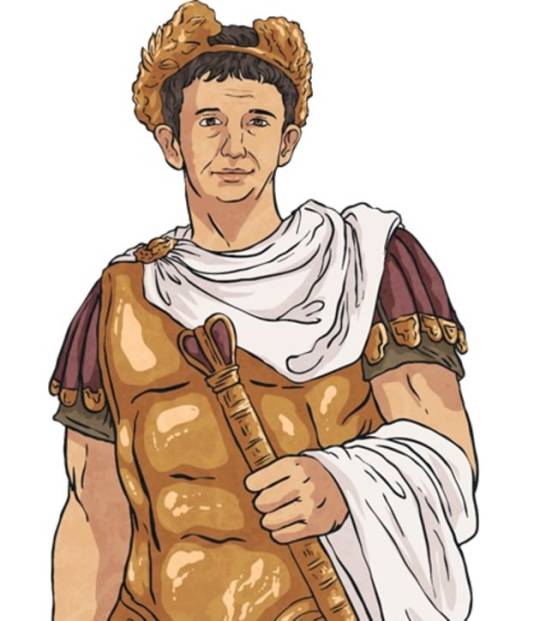
His reign was characterized by economic and military prosperity.
He distinguished himself for his policy of Meritocracy. He rewarded for ability , not for personal sympathies. He allowed men from of non-aristocratic origin access to the Senate. Among those who benefited for their merits and not for their lineage was Vespasian, who years later became emperor (69-79)
Claudius gained the respect of the Senate, the army and the people at the same time, something that had not been seen in Rome since the time of Augustus.
He had two children with his third wife: Octavia, born late year 39, and Tiberius Claudius, later nicknamed Britanicus due the conquest of Britannia, born 19 days after Claudius' accession to the throne.
He wrote many works, most during the reign of Tiberius. In addition to a history of the reign of Augustus and some treatises on the game of dice, his great passion, among his main works are a History of Etruscan civilization in twenty books, a History of Carthage in eight volumes, and a dictionary of the Etruscan language.
Unfortunately all of his works have been lost, but we know of them through the writings of others who mention them in detail.
Pliny the Elder refers to Claudius as "One of the best writers of Rome". Evidently, Claudius learned a lot from his teacher Titus Livius (Livy), author of the Ab Urbe Condita known as History of Rome.
In the year 47 Claudius celebrated the Ludi Saeculares of the eighth centenary of the founding of Rome.
The tragic end of the empress.
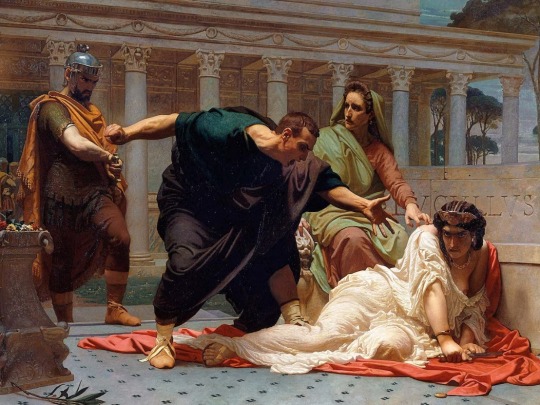
Empress Valeria Messalina becomes the lover of Senator Gaius Silius. Taking advantage of her lineage as a woman of the Julio-Claudian dynasty, she convinced that man that together they could take the throne from Claudius.
In 48, while Claudius was in Ostia, Messalina divorced him and married Silius. Three freedmen arrived in Ostia to give the incredible news to the emperor.
According to Tacitus: "Claudius, having returned to the palace, ordered that Messalina be brought to him, but the freedman Narcissus, fearing that the emperor would forgive her, ordered a freedman, a centurion, and some tribunes to proceed with the execution. The woman was overtaken in the gardens and executed; informed of his wife's death while he was at the table, Claudio would not have asked any more questions."
The senator and his group of accomplices and supporters were also executed.
Seven years earlier: Claudius ordered the return of his nieces, daughters of his deceased brother Germanicus:, Livilla and Agrippina the Younger, both exiled by Caligula in 39. Livilla was highly favored by Claudius, and Agrippina the Younger was beloved by the people. This situation caused Messalina worry and jealousy.
Messalina, through intrigue, in a very short time managed to send Livilla back into exile, along with the philosopher Seneca -a close friend and ally of Agrippina the Younger- accusing them of being lovers and conspiring. Livilla died in exile shortly after arriving.
Livilla was just one of the first victims of Messalina's intrigues. Another victim of the family was another niece of Emperor: Julia Livia, the only surviving daughter of Claudia Livia, known as Livilla (sister of Claudius) and Drusus the Younger (son of Tiberius). According to historians, an agent of the Empress, Valeria Messalina, falsely accused Julia of incest and immorality. Julia took her own life before being executed.
But Messalina could not make Claudius' other niece disappear: Agrippina the Younger, who was extremely cunning and more dangerous because she had a son, that is, a candidate for the throne who, to make matters worse, he had more blue blood than Britannicus. In all likelihood, this could be the reason Messalina attempted to overthrow Claudius.
An unusual marriage

If Senator Gaius Silius was able to use Messalina's lineage to try to overthrow Claudius by marrying her, what could another do who marries the widow Agrippina, a direct descendant of Divine Augustus? This was the reason for Claudio's incredible decision to marry his niece: simply so that no other man could marry her. Agrippina immediately accepted the proposal to become empress of Rome.
The marriage between an uncle and his niece was considered incest and a crime in Rome. However, this was not an incestuous relationship but a political union; Even so, Claudius had to present dispensations to the Senate and the religious authorities, and there were endless ceremonies in order to marry his niece.
Finally, in the year 49, in an unprecedented event in Roman history, the Emperor married his own niece. Immediately Agrippina gets Claudius to bring her close friend Seneca from exile, and orders the remains of her exiled sister to be brought to be cremated in an honorable funeral and the urn placed in the mausoleum of Augustus. Agrippina appoints Seneca as her son's tutor and teacher. Claudius granted Agrippina the title of Augusta.
In the year 50 Claudius adopted his great-nephew Lucius as son and changed his name to Nero Claudius. Agrippina's son become the heir to the throne, instead Emperor's own son. Many historians believe that this was because in the Dynasty, when choosing the successor it was more important to take into account who he was descended from in a direct line. Nero, unlike Britannicus, was a direct descendant of Augustus (great-great-grandson). Other versions suggest that Claudius' son may have suffered from an illness that prevented his appointment as successor.
Later, Claudius to marry his daughter Octavia to Nero. At that time Nero and Octavia are around 14 and 12 years old respectively. Claudius must have believed that from this marriage a grandson would become emperor, since it could not be his own son. But, like Augustus, the dream of a grandson becoming emperor did not come true.
The death

In October 13 of 54, at age 64, the emperor Claudius died during a banquet, after having eaten poisoned mushrooms, according to Juvenal's version.
There are several versions about his death, however they all agree on the theory that the emperor was poisoned. Personally, I want to believe that his death was due to natural causes. The life story of this emperor is extraordinary, it does not deserve such a poor ending.
Below, a text that is not mine but from a very important site with an extensive article on Emperor Claudius. I copy and paste the final part that I was happy to read.

However, as Levick points out, those present at the banquet do not seem to have suspected poisoning of any sort; moreover, the eunuch Halotus, whose job was to taste the Emperor's food, kept his job when Nero assumed the throne—evidence that nobody wanted to put him out of the way, either as an accomplice or as a witness to assassination. We see no reason to believe that Claudius was murdered. All the features are consistent with sudden death from cerebrovascular disease, which was common in Roman times. Towards the end of 52 AD, at the age of 62, Claudius had a serious illness and spoke of approaching death. Around that time there were changes in his depiction in busts, cameos and coins—with thick neck, narrow shoulders and flat chest. The Apocolocyntosis, addressed to an audience some of whom were present at the death, makes clear that there is no need to postulate poisoning, accidental or otherwise.
Text : © 2002, The Royal Society of Medicine.
The Divine Claudius

Sculpture of Claudius deified (1st Century) Vatican Museums.
After his death, like Augustus, he was deified.
The boy who everyone said could never achieve anything became a great writer, emperor, conqueror, and also a god.
229 notes
·
View notes
Photo

Britannicus
Britannicus (41-55 CE) was the second child and only son born to the Roman emperor Claudius (r. 41-54 CE) and Valeria Messalina (c. 20-48 CE). Seen as a threat by Claudius' fourth wife, Agrippina the Younger (15-59 CE), and her son, the future Nero (r. 54-68 CE), Britannicus was poisoned the night before his 14th birthday.
Early Childhood
Born on 12 February 41 CE, he was originally named Tiberius Claudius Caesar Germanicus; the name Britannicus was added after his father's invasion of Britain. In his The Twelve Caesars, the ancient historian Suetonius (69 to 130/140 CE) wrote, "Claudius would often pick little Britannicus up and show him to the troops or to the audience at the games either seated on his lap or held at arm's length" (197) Claudius had a son by his first wife Urgulanilla, but the boy died accidentally before coming of age, and Britannicus became the obvious choice to assume the purple upon the emperor's death. However, this would soon change when Claudius married his niece Agrippina the Younger (15-59 CE). The emperor's new wife brought with her a hidden agenda; she had high aspirations for her son, the future emperor Nero (r. 54-68 CE).
Agrippina the Younger was the daughter of Emperor Tiberius' (r. 14-37 CE) nephew Germanicus (15 BCE to 19 CE) and Agrippina the Elder (14 BCE to 33 CE), making her the great-granddaughter of Augustus (r. 27 BCE to 14 CE). Her marriage to Gnaeus Domitius Ahenobarbus produced one son Lucius Domitius Ahenobarbus, the future Nero (b. 37 CE). Gnaeus, who died when Nero was three, was extremely violent and was described by his contemporaries as "a despicable character." Two years after Domitius' birth, Agrippina was exiled by her brother Caligula (r. 37-41 CE). After Caligula's assassination in 41 CE, one of Claudius' first acts was to recall her. Her strong ties to the Julio-Claudians would pose a serious challenge to young Britannicus' position as the emperor's heir and, unfortunately for Britannicus, the highly aggressive Agrippina would stop at nothing until little Domitius upended his position. According to Matthew Dennison in his The Twelve Caesars, Agrippina "was not distracted by bodily appetites; arrogance and an undistracting focus steadied her performance." (156)
In 40 CE Domitius' father died of dropsy. Upon her return to Rome from exile, the widowed Agrippina married Gaius Passienus Crispus, who had recently divorced Gnaeus Domitius Ahenobarbus' sister Domitia. The marriage ended before 47 CE, possibly due to poisoning. Agrippina inherited his vast wealth, making her extremely rich. Widowed twice, she set her sights on husband number three: her uncle Claudius. Claudius showed little interest in obtaining another wife; there was still strong competition for the old emperor: Aelia Paetina (his second wife) and Lollia Paulina (Caligula's third wife). Lollia would later be exiled on the orders of Agrippina where a suicide would soon follow. However, Claudius' financial secretary Marcus Pallas favored Agrippina, and on 1 January 49 CE, she became Claudius' fourth wife.
Having married the emperor, her next objective was to secure the adoption of her son, and on 28 February 50 CE, Lucius Domitius became Nero Claudius Drusus Germanicus Caesar. Suetonius wrote, "In his last years, Claudius made it pretty plain that he repented of having married Agrippina and adopted Nero" (204). Realizing, the possible danger posed by Nero and his mother, Claudius told his son repeatedly "to grow up quickly." With the adoption of Nero secured, Agrippina turned her attention to the one serious obstacle to her son becoming the emperor: Britannicus.
Continue reading...
33 notes
·
View notes
Text

Aelia (they/them)
Child of Bacchus
Step-child of Caligula
I’m going to draw them soon
#heroes of olympus#trials of apollo#percy jackson#percy jackon and the olympians#pjo#pjo hoo toa#hoo#toa#triumvirate holdings#Caligula toa#toa caligula#pjo oc#percy jackson oc#HoO oc#heroes of olympus oc#toa oc#trials of apollo oc
25 notes
·
View notes
Text

Plautia Urgulanilla (fl. 1st century) was the first wife of the future Roman EmperorClaudius. They married sometime around the year 9 AD when Claudius was 18 years old. According to Suetonius, Claudius divorced her in 24 on grounds of adultery by Plautia and his suspicions of her involvement in the murder of her sister-in-law Apronia.Her father was Marcus Plautius Silvanus, a general who was consul for the year 2 BC. He had been honored with a triumph.Urgulanilla was named for her grandmother, Urgulania, a close friend of the Empress Livia Drusilla.
She gave birth to a son, Claudius Drusus, whose betrothal to a daughter of Sejanusinstilled great expectations in the prefect,which were left unfulfilled when Drusus died in early childhood.Urgulanilla had a daughter, Claudia, who was born five months after her divorce from Claudius. As Claudia was widely known to be the illegitimate daughter of the freedman Boter, Claudius repudiated the child and he had her laid at Urgulanilla's doorstep. Her adopted nephew was Tiberius Plautius Silvanus Aelianus.Urgulanilla was Etruscan.A brother of Urgulanilla was made a patrician by Claudius. Tiberius Plautius Silvanus Aelianus, the adopted son of another of her brothers, became consul in 45.
Aelia Paetina or Paetina (fl. early 1st century AD) was the second wife of the Roman Emperor Claudius. Her biological father was a consul of 4 AD, Sextus Aelius Catus, while her mother is unknown.She was born into the family of the AeliiTuberones, and thus apparently descended from the consul of 11 BC, Q. Aelius Tubero. Her father may have died when she was very young, as she was raised by a relative—Praetorian Guard Prefect Lucius Seius Strabo, the biological father of her adoptive brother Lucius Aelius Sejanus, commander of the Praetorian Guard under the Emperor Tiberius.
Aelia Paetina married the future Emperor Claudius in 28 as his second wife. Their only child was their daughter Claudia Antonia, born in 30. Claudius divorced Paetina after October of 31 AD, when her adoptive brother fell from power and was murdered. According to Suetonius, Claudius divorced Paetina for slight offenses.
In 48, after the execution of Claudius’ third wife Valeria Messalina, Claudius considered marrying for the fourth time. Claudius’ freedman Tiberius Claudius Narcissussuggested to him a remarriage to Paetina, and reminded him they had a child together. Narcissus also stated that Paetina would cherish Antonia in addition to Claudia Octaviaand Britannicus, Claudius’ children with Messalina. But another freedman, Gaius Julius Callistus, was against Claudius remarrying Paetina and stated to Claudius that he divorced her before; Callistus said that remarrying Paetina would make her more arrogant. Callistus suggested Lollia Paulina, Caligula's third wife. The third freedman, Marcus Antonius Pallas, recommended Claudius' niece and Caligula's sister Agrippina the Younger, who also had a child from a previous marriage, the future Emperor Nero. Ultimately, Agrippina was chosen.Paetina's daughter Antonia was executed in 65 or 66, shortly after the death of Nero's second wife Poppaea Sabina.
Messalina Valeria, Messalina also spelled Messallina, (born before AD20—died 48), third wife of the Roman emperor Claudius, notorious for licentious behaviour and instigating murderous court intrigues. The great-granddaughter of Augustus’ssister, Octavia, on both her father’s and mother’s sides, she was married to Claudius before he became emperor (39 or 40). They had two children, Octavia (later Nero’s wife) and Britannicus. Early sources maintain that Messalina allied herself with Claudius’s freedmen secretaries to dominate the emperor and to gratify her avarice and lust. In 42, Messalina caused Claudius to condemn to death a senator, Appius Silanus, who had slighted her advances. This heightened the tension between the emperor and Senate and prepared the way for a reign of terror in which many senators were executed after they had been denounced by Messalina. When she caused the death of Claudius’s freedman secretary, Polybius, however, the other freedmen turned against her. The correspondence secretary, Narcissus, managed to have her put to death by convincing Claudius that she and her lover, the consul designate Gaius Silius, had gone through a public wedding ceremony and were plotting to seize power.
Julia Agrippina, also called Agrippina the Younger, (born AD 15—died 59), mother of the Roman emperor Nero and a powerful influence on him during the early years of his reign (54–68).Agrippina was the daughter of Germanicus Caesar and Vipsania Agrippina, sister of the emperor Gaius, or Caligula (reigned 37–41), and wife of the emperor Claudius (41–54). She was exiled in 39 for taking part in a conspiracy against Gaius but was allowed to return to Rome in 41. Her first husband, Gnaeus Domitius Ahenobarbus, was Nero’s father. She was suspected of poisoning her second husband, Passienus Crispus, in 49. She married Claudius, her uncle, that same year and induced him to adopt Nero as heir to the throne in place of his own son. She also protected Seneca and Burrus, who were to be Nero’s tutors and advisers in the early part of his reign. She received the title of Augusta.
In 54 Claudius died. It was generally suspected that he was poisoned by Agrippina. Because Nero was only 16 when he succeeded Claudius, Agrippina at first attempted to play the role of regent. Her power gradually weakened, however, as Nero came to take charge of the government. As a result of her opposition to Nero’s affair with Poppaea Sabina, the Emperor decided to murder his mother. Inviting her to Baiae, he had her set forth on the Bay of Naples in a boat designed to sink, but she swam ashore. Eventually she was put to death on Nero’s orders at her country house.
Source: Encyclopædia Britannica
#emperor claudius#claudius#AD#roman empire#perioddramaedit#history#edit#history edit#roman emperor#plautia urgulanilla#aelia paetina#valeria messalina#agripinna the younger#nero#caligula#seutonius#roman history#ancient rome#rome#ancient history#narcissus#poppaea sabina#women in history#women of history#roman women#polybius#diane kruger#viva bianca#alessandra mastronardi#anna hutchison
93 notes
·
View notes
Text
Famous people
Tag list of famous people from Ancient Rome and Greece. A few hellenistic rulers and some Etruscans are also included.
And for some reason the page is not working properly. The HTML code is there, but it only works on my dashboard. On this page links are inactive. I figure that page only understands “/tagged/Agrippina-the-Elder” - versions, but I’m too lazy / busy to rewrite the code. So if you want to check a tag, you’ll have to copy and paste it after the word “ .../tagged/”. And same goes for all the lists below.
URLs + copy&paste:
https://romegreeceart.tumblr.com/tagged/
https://romegreeceart.tumblr.com/archive/tagged/
A
Aelia Flaccilla- Pillar of the Church
Agrippina the Elder
Agrippina the Younger
Aemilia Lepida and her descendants v emperor Nero
Aeschylus
Aetius
Alaric
Alcibiades
Alexander the Great
Ancus Marcius
Antinous
Antiochus I Soter
Antiochus III the Great
Antisthenes (philosopher, cynic school)
Antonia Minor - mother of Claudius and Germanicus
Antoninus Pius
Apicius
Apollodorus of Damascus
Apollonius of Tralles (Greek sculptor)
Aristotle
Arsinoe II
Arsinoe III
Artemisia II of Caria
Aspasia
Atticus (Cicero’s friend)
Attila
Augustus
Aulus Rustius Verus (Pompeian politician)
Aurelianus
B
Baltimore painter (Apulia, 4th century BCE)
Berenike II
Britannicus
Brygos Painter
Brutus (liberator, founder of the republic)
Brutus (assassin)
C
Caesarion
Caligula
Callimachus
Caracalla
Carausius (Roman Britain, emperor)
Carinus
Cassius Dio
Catiline
Cato the Elder
Cato the Younger
Cicero
Claudia Antonia (emperor’s daughter)
Claudius
Claudius Gothicus
Cleopatra
Cleopatra Selene
Cleopatra III
Clodius Albinus
Commodus
Constantine the Great
Constantius II
Constantius Chlorus
Corbulo
Cornelia Africana
Cornelia Minor (Caesar’s wife)
Crispina
Crispus (Constantine’s eldest son)
Croesus
Cynisca (Spartan princess, olympic winner)
D
Darius III
Decius
Demosthenes
Didia Clara (daughter of Didius Julianus)
Didius Julianus
Diocletianus
Dioscorides Pedanius (physician, botanist)
Diva Claudia (daughter of Nero)
Domitianus
Drusus Caesar (son of Germanicus)
Drusus the Younger (son of Tiberius)
Drusus the Elder (son of Livia)
E
Elagabalus
Eumachia (Pompeian priestess and patroness)
Euripides
F
Fabius Maximus Cunctator (”The Shield of Rome”)
Faustina Maior
Faustina Minor
Female painters
Flavian dynasty
G
Gaius Caesar
Galerius
Galba
Galen
Galla Placidia
Gallic emperors
Gallienus
Germanicus
Gelon
Gens Aemilia
Gens Cornelia
Gens Calpurnia
Geta
Gordian I
Gordian II
Gordian III
Gracchi Brothers
Gratian
Greek tyrants
H
Hadrianus
Hannibal
Hegias (Greek sculptor, 5th century BCE
Hellenistic kings
Herennius Etruscus (co-emperor)
Hermione Grammatike
Herodes Atticus
Herodotus
Hippocrates
Historians
Homeros
Honorius
Hostilianus
I
Iaia of Cyzicus (female painter)
Jovianus
Juba II
Julia (Augustus’ daughter)
Julia Aquilia Severa (Vestal virgin and empress)
Julia Domna
Julia Drusilla
Julia Felix (Pompeian business woman)
Julia Flavia (Titus’ daughter)
Julia Maesa
Julia Soaemias
Julian the Apostate
Julio-Claudian family (julioclaudian)
Julio-Claudian dynasty
Julio-Claudian
Julio-Claudian dynasty
Julius Caesar 1
Julius Caesar (2)
Julius Vindex
K
Kings
Kresilas (Athenian sculptor)
Kritios (Athenian sculptor)
L
Lady of Aigai
Lady of Vix (Celtic woman, late 6th century BCE)
Lassia (priestess of Ceres, Pompeii)
Lepidus
Leonidas
Livia
Livilla
Livius
Lucilla (daughter of Marcus Aurelius)
Lucius Appuleius Saturninus
Lucius Caecilius Jucundus (Pompeian banker)
Lucius Caesar
Lucius Herennius Flores (Boscoreale Villa, real owner ?)
Lucius Verus
Lysippos
Lysippos 2
M
Maecenas
Macrinus
Magnus Maximus
Mamia (Pompeian priestess and patroness)
Marcellus (Augustus’ heir)
Marcus Agrippa
Marcus Antonius
Marcus Aurelius
Marcus Claudius Tacitus (emperor)
Marcus Licinius Crassus
Marcus Terentius Varro
Marius
Martialis
Masinissa
Maussollos of Halicarnassos
Maxentius
Maximianus
Maximinus Daia
Maximinus Thrax
Members of imperial families
Menander
Miami painter
Milonia Caesonia
Miltiades (Greek general)
Mona Lisa of Galilee
Myron
N
Nero
Nero Julius Caesar (son of Germanicus)
Nerva
Nerva-Antonine family
Numa Pompilius
O
Octavia the Younger (Augustus’ sister)
Octavia (Claudius’ daughter)
Optimates
Otho
Ovidius
P
Paionios (Greek sculptor)
Patronesses
Penthesilea painter
Pericles
Pertinax
Pescennius Niger
Pheidias
Philip the Arab
Philosophers
Philip II of Macedonia
Phryne (Greek courtesan)
Plancia Magna
Plato
Pliny the Elder
Pliny the Younger
Poets
Polykleitos
Pompeius
Poppaea Sabina
Populares
Postumus Agrippa
Postumus (Gallic emperor)
Probus
Ptolemy of Mauretania
Praxiteles
Ptolemy I
Publius Clodius Pulcher
Publius Fannius Synistor
Publius Licinius Crassus (triumvir’s younger son)
Publius Sittius
Publius Quinctilius Varus
Pythagoras
Pyrrhus
Pytheas (a greek explorer)
Q
Queens
R
Roman Caesars (= princes, heirs to the throne)
Roman Civil War Commanders
Roman client kings
Roman consuls
Roman dictators
Roman emperors
Roman empresses
Roman generals
Roman gentes
Romans who declined the throne
Romulus Augustulus
Romulus and Remus
S
Sabina
Sallustius
Sappho
Scipio Africanus
Scopas
Sejanus
Septimius Severus
Seven sages
Severan dynasty
Severus Alexander
Sextus Pompeius
Shuvalov painter
Silanion ( Greek sculptor)
Socrates
Solon
Sophocles
Stilicho
Strabo
Sulla
Sulpicia (Roman female poet)
T
Tacitus
Tarpeia
Tarquinius Superbus
Themistocles
Theodosius
Theophrastus
Thucydides
Tiberius
Tiberius Claudius Verus (Pompeian politician)
Tigranes the Great
Titus
Titus Labienus
Titus Tatius
Titus Quinctius Flaminius
Trajanus
Trebonianus Gallus
Tribunes of the plebs
U
Ulpia Severina (interim sovereign in 275 CE)
Urban prefects
Usurpers
V
Vaballathus (Palmyran king)
Valens
Valentinianus I
Valentinianus III (murderer of Aetius)
Valerianus
Valeria Messalina
Vel Saties
Velia Velcha (“Mona Lisa of antiquity”)
Velimna family (Hypogeum, Brescia)
Vercingetorix
Vergilius
Vespasianus
Vibia Sabina
Vipsania Agrippina
Viriathus (Lusitanian freedom fighter)
Vitellius
Volusianus
X
Xenophon
Y
Z
Zenobia
186 notes
·
View notes
Photo
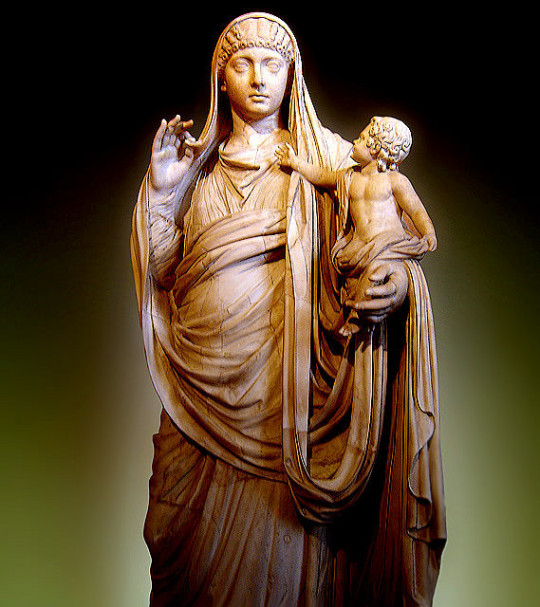
Britannicus
Britannicus (41-55 CE) was the second child and only son born to the Roman emperor Claudius (r. 41-54 CE) and Valeria Messalina (c. 20-48 CE). Seen as a threat by Claudius' fourth wife, Agrippina the Younger (15-59 CE), and her son, the future Nero (r. 54-68 CE), Britannicus was poisoned the night before his 14th birthday.
Early Childhood
Born on 12 February 41 CE, he was originally named Tiberius Claudius Caesar Germanicus; the name Britannicus was added after his father's invasion of Britain. In his The Twelve Caesars, the ancient historian Suetonius (69 to 130/140 CE) wrote, "Claudius would often pick little Britannicus up and show him to the troops or to the audience at the games either seated on his lap or held at arm's length" (197) Claudius had a son by his first wife Urgulanilla, but the boy died accidentally before coming of age, and Britannicus became the obvious choice to assume the purple upon the emperor's death. However, this would soon change when Claudius married his niece Agrippina the Younger (15-59 CE). The emperor's new wife brought with her a hidden agenda; she had high aspirations for her son, the future emperor Nero (r. 54-68 CE).
Agrippina the Younger was the daughter of Emperor Tiberius' (r. 14-37 CE) nephew Germanicus (15 BCE to 19 CE) and Agrippina the Elder (14 BCE to 33 CE), making her the great-granddaughter of Augustus (r. 27 BCE to 14 CE). Her marriage to Gnaeus Domitius Ahenobarbus produced one son Lucius Domitius Ahenobarbus, the future Nero (b. 37 CE). Gnaeus, who died when Nero was three, was extremely violent and was described by his contemporaries as "a despicable character." Two years after Domitius' birth, Agrippina was exiled by her brother Caligula (r. 37-41 CE). After Caligula's assassination in 41 CE, one of Claudius' first acts was to recall her. Her strong ties to the Julio-Claudians would pose a serious challenge to young Britannicus' position as the emperor's heir and, unfortunately for Britannicus, the highly aggressive Agrippina would stop at nothing until little Domitius upended his position. According to Matthew Dennison in his The Twelve Caesars, Agrippina "was not distracted by bodily appetites; arrogance and an undistracting focus steadied her performance." (156)
In 40 CE Domitius' father died of dropsy. Upon her return to Rome from exile, the widowed Agrippina married Gaius Passienus Crispus, who had recently divorced Gnaeus Domitius Ahenobarbus' sister Domitia. The marriage ended before 47 CE, possibly due to poisoning. Agrippina inherited his vast wealth, making her extremely rich. Widowed twice, she set her sights on husband number three: her uncle Claudius. Claudius showed little interest in obtaining another wife; there was still strong competition for the old emperor: Aelia Paetina (his second wife) and Lollia Paulina (Caligula's third wife). Lollia would later be exiled on the orders of Agrippina where a suicide would soon follow. However, Claudius' financial secretary Marcus Pallas favored Agrippina, and on 1 January 49 CE, she became Claudius' fourth wife.
Having married the emperor, her next objective was to secure the adoption of her son, and on 28 February 50 CE, Lucius Domitius became Nero Claudius Drusus Germanicus Caesar. Suetonius wrote, "In his last years, Claudius made it pretty plain that he repented of having married Agrippina and adopted Nero" (204). Realizing, the possible danger posed by Nero and his mother, Claudius told his son repeatedly "to grow up quickly." With the adoption of Nero secured, Agrippina turned her attention to the one serious obstacle to her son becoming the emperor: Britannicus.
Continue reading...
32 notes
·
View notes